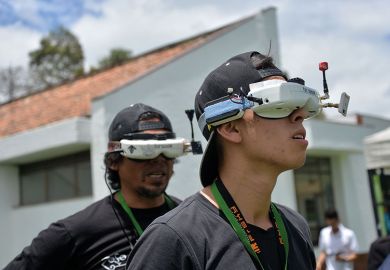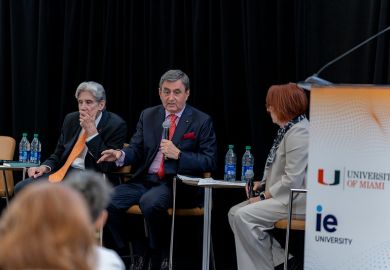The rapid shift to remote learning has demonstrated that it’s no longer enough for academics to prioritise research and scholarly publication above their teaching responsibilities. Today’s diverse students need much more interaction with their professors inside and outside class. They also need more extensive feedback on their academic performance.
If our institutions of higher learning are to truly promote equity and serve as engines of social mobility – as they purport to prioritise – then professors need to think about themselves in new ways: as learning architects and as advisors and mentors, not just for graduate students, but undergraduates as well.
Faculty are on the front lines of education and need to understand that their responsibilities go well beyond the transmission of disciplinary expertise. We certainly have a moral and professional duty to identify students who are struggling and take appropriate steps to address their needs, but there’s much more we can do.
A first step is to professionalise university teaching. University professors are the only professionals who receive little or no formal training in their primary responsibility – teaching – and who are not required to meet continuing education requirements. As a result, most college instructors lack a serious understanding of effective teaching practices, classroom management, instructional design or assessment.
Effective digital course design and implementation from four online teaching experts
We need to give lecturers greater access to instructional designers, educational technologists, and assessment specialists, but the quality of undergraduate learning can also improve if teachers educate themselves in the learning sciences. Drawing on insights from cognitive neuroscience and educational and developmental psychology can allow them to bring research-informed practices into their teaching.
Given the diversity of today’s college students, faculty must better understand how students learn. This requires a basic understanding of intrinsic and extrinsic motivation, attention and focus, and short- and long-term memory.
It also demands familiarity with key principles of learning: That it is better to space out learning of key concepts and skills over longer periods of time than to concentrate it all at once; and to quiz students frequently rather than administer a small number of high-stakes tests. The learning sciences also stress the importance of scaffolding instruction – carefully sequencing learning activities to build students’ confidence and knowledge as they develop new skills – and of metacognition, teaching them how to monitor and self-assess their grasp of particular concepts and their command of essential skills and competencies.
A second key step is to encourage lecturers to think of themselves as learning architects who define measurable learning objectives; carefully engineer classroom activities to ensure that students master essential knowledge and skills; and design assessments to verify that students actually achieve an appropriate level of competence.
This requires faculty to design learning activities to help students attain specific learning goals, a method known as “backward design,” and to assess learning not with letter grades that rank students, but by whether they have mastered essential skills and knowledge, an approach known as specifications or mastery learning.
Pausing playback: training students to take notes online
Instructional engineering requires classroom-tested technologies and pedagogies that make courses more engaging and interactive and bring all students, however unequal their educational background, to mastery.
These approaches emphasise active learning including inquiry, problem-solving, role-playing, debate, simulations, and analysis of case studies, which helps nurture students’ higher-order thinking skills, including the ability to analyse, apply and synthesise knowledge.
In addition, college teachers need to deploy frequent low-stakes formative assessments and data – on student engagement and areas of ignorance or confusion – to monitor student progress, modify their instruction, and intervene when appropriate.
Third, faculty need to take their advising and mentoring roles much more seriously. Most universities will never have sufficient advisers, counsellors, disability specialists, career service professionals, and other support service providers to meet all their students’ needs. Given that reality, professors must step up to the plate and take it upon themselves to provide mentoring to their students.
Faculty, for example, should offer their students windows into career possibilities, help them assess their talents and interests, and assist them in charting a realistic path forward academically and professionally. Likewise, they should design assignments that will help students acquire 21st-century competencies demanded by today’s workplaces, which include advanced oral and cross-cultural communication skills, proficiency in critical and analytical thinking, information and technological literacy, and leadership and collaboration skills.
Fourth, and similarly, lecturers need to embrace a new relationship with our students. Rather than thinking of students as customers or wet-behind-the-ear novices, we need to think of them as partners and producers of knowledge.
We need to treat our students as co-creators of knowledge who take an active role in research, the creation of educational resources and curricular content, and teaching itself. Teacher-student collaboration and authentic experiences in professional practice are the hallmarks of this form of participatory pedagogy. All professors are publishing scholars and have the ability to integrate disciplinary-based writing instruction into their classes.
To this end, a growing number of institutions have established “maker spaces” where students, with faculty support and supervision, create marketable projects. They have also instituted undergraduate research experiences, sent students to work in archives, and placed students in mentored internships in museums, community service organisations and for-profit corporations.
Graduate programmes encourage narrow disciplinary specialisation, while our current approach to salary and professional recognition and advancement favours a laser-like focus on research and publication. It’s not surprising then that professors have been trained and socialised in ways that discourage them from prioritising their pedagogical and mentoring responsibilities.
But the pandemic has presented us with an opportunity to fundamentally change the culture and incentive structure surrounding university teaching. We shouldn’t waste it. Our students deserve no less.
Steven Mintz is professor of history at the University of Texas at Austin.
Register to continue
Why register?
- Registration is free and only takes a moment
- Once registered, you can read 3 articles a month
- Sign up for our newsletter
Subscribe
Or subscribe for unlimited access to:
- Unlimited access to news, views, insights & reviews
- Digital editions
- Digital access to THE’s university and college rankings analysis
Already registered or a current subscriber? Login








